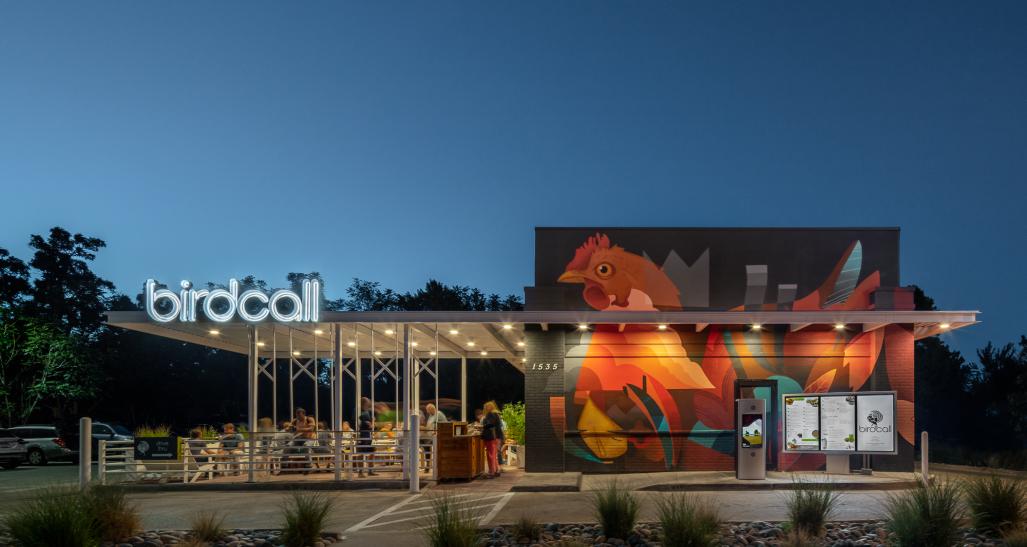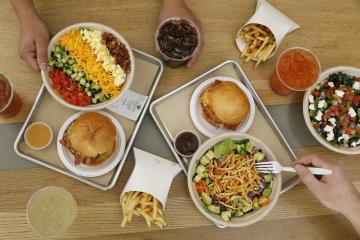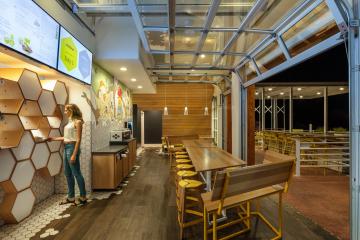
Peter Newlin champions what he believes is a compelling proposition for his company’s Birdcall restaurant.
Birdcall, which serves up a variety of chicken sandwiches along with salads and side dishes, has joined a revolution of sorts that is ushering in a new way consumers satisfy their fast-food fix — unapologetically following in the footsteps of forerunners like Andrew Weil’s True Food Kitchen concept, salad-meister Sweetgreen, burger maven Shake Shack and others.
“These brands all understand [quick-service design and operations], and we’re just on a mission that they started,” says Newlin, CEO of Birdcall and president of parent Gastamo Group, based in Denver. “Previously, people didn’t think about design quality” as a component of the QSR concept.
Integral to Birdcall’s retail restaurant strategy is leveraging technology and innovation to serve customers efficiently while offering enticing foods and creating a sense of belonging in the communities where it operates through initiatives like its "1% back to the community program."
'More accessible' natural foods
Gastamo Group, led by co-founder and CEO Jean-Philippe Failyau, operates three Birdcall restaurants in the Denver area. Newlin says the company plans to launch up to six new locations by the end of 2020, primarily throughout Colorado, but is also opening its first out-of-state location in Scottsdale, Ariz.
Other restaurant brands under the Gastamo Group banner include Park Burger, Park & Co., Homegrown Tap & Dough and Nomada. Along with Birdcall, the brands share a strong focus on fresh ingredients and local sourcing to offer quality food and hospitality in their communities.

When Gastamo Group established Birdcall in 2017, Newlin embarked on a tour of the country to study the unique operations of similar QSR brands that have been instrumental in recasting the category well beyond the traditional concepts of QSR stalwarts. He recalls being captivated, for instance, by the approach to packaging of California-headquartered Sweetgreen — all the way down to how it designed the salad bowls for its nearly 80-store national footprint.
“If we can deliver that level of quality at a lower price point, then we are really sticking to what we believe in,” Newlin says, “which is making natural foods more accessible.”
Featuring dishes garnished with ingredients like buttermilk herb mayo, bacon red onion jam, habanero aioli and peanut slaw, Birdcall stays true to natural and local sourcing. Its chicken products come direct from Colorado family farms, its buns and rolls are produced at a Colorado baking company and its spices are developed by a Denver spice firm. Even Birdcall beverages are certified organic, sourced from the Tractor Beverage Co., a craft fountain soda producer based in Coeur d'Alene, Idaho.
“We pride ourselves on our relationships with local vendors for the freshest ingredients. We’re building a company that we are proud of and that our team members can be proud of,” Newlin says. “It gives us the opportunity to create better quality food in the QSR market and that is something we are going stick to and hold strong.”
The appeal of quick serve
Launching Birdcall as a QSR chain fits where much of the restaurant industry seems to be headed. QSR is synonymous with the fast and efficient delivery of foods at competitive price points, typically in the range of $5 to $8 per meal. Table service in QSR is rare and take-out orders are plentiful.
While total U.S. foodservice traffic remained flat going into 2019, the QSR segment was up 1 percent.
NPD Group
Retail analyst NPD Group reported in April 2019 that while total U.S. foodservice traffic remained flat going into 2019, the QSR segment was up 1 percent; U.S. consumer traffic volume for commercial restaurants was 61 billion visits in the year ending June 2019. The QSR segment, in addition to its penchant for fast service and low prices, also is shedding the notion among consumers of serving bad food, creating a positive value against market-dominant full-service restaurants amid declining customer visits in the segment, according to NPD Group.
Orienting Birdcall as a QSR was a no-brainer, given that the “operations flows are simpler and problems easier to solve,” Newlin says.
“In a full-service restaurant, it is much more challenging. Full service relies more on human connections and different layers of hospitality and service. Traditionally, in a QSR, you just place the order. When it pops up on the counter, you grab it.”
Typical Birdcall locations employ just one team member to assist customers with ordering, eliminating the point-of-sale counter personnel associated with traditional QSRs.
Newlin says its use of technology is what makes the Birdcall concept truly tick in bringing its many operational components together. “Technology is where we see a lot of innovation opportunities,” he says. “We’re looking at solutions to solving problems in a different way because we are building a technology from a restaurant mindset.”
Birdcall’s customers order food through the restaurant’s proprietary, end-to-end kiosk system. Early on, executives decided it would be more prudent to establish its own system rather than using third-party hybrid systems.
“What we found very quickly was that building technology to integrate with another platform didn’t make sense,” Newlin says. “We didn’t want to be controlled by another party. We are able to respond to challenges and make changes quicker.”
Digital growth potential
Looking down the road, Newlin sees the kiosk system as a momentary platform of choice; the real breakthroughs, he believes, will come via mobile and internet/app ordering via customers’ personal devices.

NPD Group agrees with that assessment, noting that while it represents a tiny amount of restaurant traffic share today, digital ordering is growing fast. The sub-segment has grown by 23 percent over the past four years and now represents 3.1 billion consumer restaurant visits annually, NPD Group says, and a $26.8 billion market.
Newlin says because Birdcall employs its own technology platform — infrastructure that includes a formalized hub to test new processes — the march to greater mobile ordering will position Birdcall for the future.
“This has evolved into something bigger,” Newlin says. “As we started building the technology, we saw the amazing opportunities to solve other problems in the restaurant through the data that we are collecting. What we are focused on right now is taking the simplified operational process that we created and building additional layers on it, more layers on the hospitality and more layers on service, while keeping the process simple.”